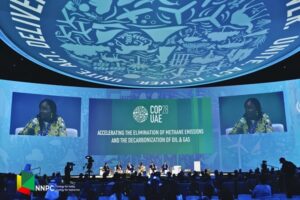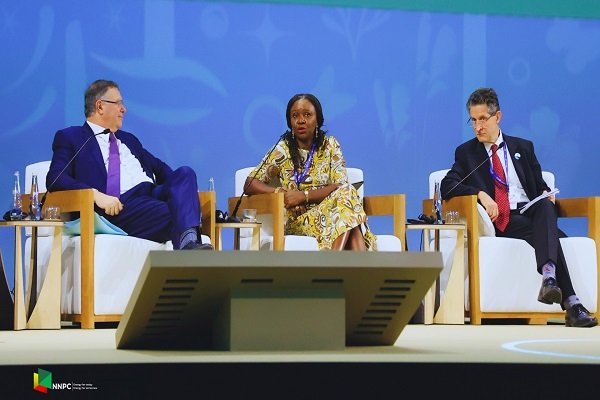The Nigerian National Petroleum Company Limited (NNPCL) has expressed its commitment to work with global partners in the march towards reducing methane emissions in oil and gas operations.
On the sidelines of the ongoing United Nations Climate Change Conference, also known as COP28, taking place in Dubai, the United Arab Emirates, the Oil and Gas Decarbonization Charter was released.
The charter called on the oil and gas sector to achieve the goal of reaching net-zero emissions for their operations by 2050. It also includes commitments to achieve near-zero methane emissions and no routine flaring by 2030.

Speaking on the development during a Panel Session titled, “Accelerating the Elimination of Methane Emissions & the Decarbonisation of Oil & Gas,” the NNPCL Executive Vice President, Upstream, Oritsemeyiwa Eyesan, said the charter was a major opportunity not just for the NNPCL but for the African sub-region.
READ ALSO: Reps indict NPA, NNPCL, others over N13.9trn contingent liabilities
“Africa contributes three percent to emissions, but that does not exclude us from the consequences of the emissions. I think the decarbonisation drive and the charter are not just ethical but also a strategic imperative for a major African National Oil Company (NOC) like ours.
“We believe this charter is an important one. We are committed to working with all stakeholders to deliver on that,” Eyesan was quoted as saying in a statement issued by the NNPCL spokesman, Olufemi Soneye, on Tuesday, December 5.
She said to achieve its near-zero methane emissions, Nigeria has since declared this decade as ‘Decade of Gas’, which she said is not only geared towards producing more gas for export, but also towards producing gas for local economy and that of the entire African sub-region.
“I assure you that we are open to working with our partners towards achieving zero-flare and methane emission reduction by 2030. This fits perfectly with our dreams, and we consider it achievable,” Eyesan added.
She described finance and technology as the two major challenges in delivering on the provisions of the charter, noting that for the two problems to be solved, African countries need to work with partners who have the technology and finance.
She said NNPCL remains committed to expanding its alternative energy sources through investment in solar, wind, and other renewable sources.
- Tinubu halts purchase of petrol vehicles, orders agencies to buy CNG vehicles - May 13, 2024
- Obi: Why I visited Atiku, Saraki, Lamido - May 13, 2024
- Senator: Why I donated burial materials to my constituents - May 13, 2024










